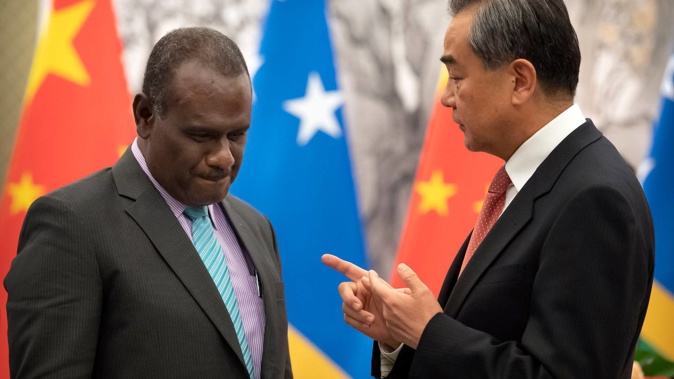
China is seeking a region-wide deal with at least 10 Pacific islands nations, confidential documents leaked to Newstalk ZB show.
It comes ahead of a meeting Foreign Minister Wang Yi is hosting in Fiji next week, as part of his eight-stop tour across the Pacific.
Newstalk ZB political reporter Aaron Dahmen was one of the first journalists in the world to obtain a copy of the draft communique and five-year action plan.
In it, China seeks cooperation on matters as broad as policing, biometrics, and scholarships.
The documents have been widely circulated by Beijing to Pacific nations ahead of the foreign ministers’ meeting on May 30. That will fuel fears China is trying to establish a foothold in the Pacific, following a security pact inked with the Solomon Islands last month.
The draft communique said, "China will hold immediate and high-level police training for Pacific Island through bilateral and multilateral means.
Its proposed five-year action plan added China would "provide assistance in laboratory construction use for fingerprints testing, forensic autopsy, drugs, electronic and digital forensics".
The sums of money mentioned in the agreement were not large - US$200,000 (NZ$300,000) - and would be provided by China to the Secretariat of Pacific Regional Environment Programme (SREP) in 2022 to continue to provide aid. China would also provide US$1.08 million (NZ$1.6m) to the Pacific Islands Forum this year.
In the context of the Pacific, however, the amount of money offered is relatively significant. The Pacific Islands Forum received about NZ$4.4m in member contributions in 2020, a big portion of its NZ$14.3m annual income.
Guangdong also promised about NZ$11.5m in "livelihood assistance".
The agreement reiterated a target of doubling bilateral trade volume by 2025 from 2018 levels, and an ambition for greater investment from Chinese companies in the Pacific.
It promised greater cultural cooperation, including institutions that would promote cultural cooperation across the region.
China also pledged a number of scholarships: 100 "training opportunities" for professionals, 20 scholarships from Tianjin municipality, and 2500 other scholarships from 2022-2025.
But the proposed deal had some strings.
The communique opened by promising that "all countries, regardless of their size, strength and wealth, are equals".
This is balanced by the islands reaffirming they "firmly abide by the one-China principle" and uphold “the principle of non-interference of internal affairs in international relations".
Put simply, nations that sign-up will have to toe China's line on the issue of Taiwan.
The document is already raising eyebrows, with indications of dissatisfaction.
In a letter to 21 Pacific leaders, Federated States of Micronesia President David Panuelo reportedly said his nation would argue the "pre-determined joint communique" should be rejected, because he fears it could spark a new "Cold War" between China and the West.
China's growing presence in the Pacific has been alluded to as a concern by New Zealand’s defence officials, who wrote in the 2021 Defence Assessment that the "establishment of a military base or dual-use facility in the Pacific by a state that does not share New Zealand's values and security interests" was a key risk.
Prime Minister Jacinda Ardern, speaking during her trip to the United States, said the Pacific was a "contested region".
"We want cooperation in areas where we have shared concern, like climate adaptation and mitigation," she said.
"We want quality investment in infrastructure. We don't want militarisation. We don't want an escalation in tension. We want peace and stability."
- Additional reporting by Thomas Coughlan, NZ Herald
Take your Radio, Podcasts and Music with you









